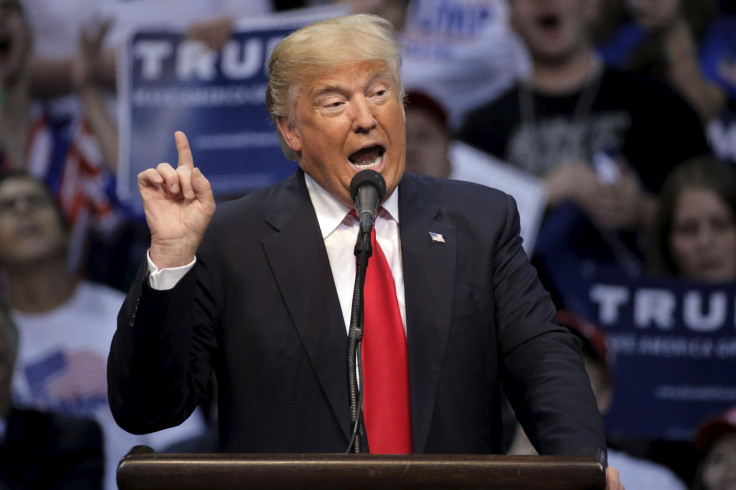Can Donald Trump Win The 2016 GOP Nomination? Math Says Yes As Kasich, Cruz Push For Brokered Convention

A growing sense of desperation from establishment Republicans to stop front-runner Donald Trump from winning the party’s nomination has been simmering for months. But it may be too little, too late for the businessman’s competition as the number of delegates up for grabs winnows in the primary season's final stretch and Trump looks to polish off his lead with wins in several delegate-rich states over the next two months.
Some Republicans have argued recently that Trump’s window to secure the 1,237 delegates necessary to clinch the party’s nomination outright has closed, but the math behind that rationale paints a different picture. Trump, who needs roughly 392 delegates to lock up the nomination and avoid a contested convention — assuming the party establishment doesn't change rules at the last minute to unbind delegates and allow them to vote for whomever they want — has a very narrow path forward to outright beat Texas Sen. Ted Cruz and Ohio Gov. John Kasich.
“Trump is the only one who can mathematically win on the first ballot,” Ford O’Connell, who worked on Arizona Sen. John McCain’s 2008 presidential campaign, said. “Cruz and Kasich are mathematically eliminated."
A review by International Business Times of recent polls in upcoming states shows that should Trump’s current leads be maintained, the GOP front-runner is roughly on track to meet his targets in each of the upcoming states.
Nothing is a sure bet, of course, and there are some specific states where often-confusing delegate allocation rules could figure prominently in determining whether Trump is the Republican nominee.
Those states include New Jersey, which votes June 7 and has a winner-take-all allocation method for its 51 delegates. Joining New Jersey at the top of the list of important states for Trump is Pennsylvania, which votes Tuesday and has 71 delegates, and Indiana, which votes May 3 with 57 delegates at stake. Both states have a hybrid allocation system in place. Trump leads in polling in all three of those states, taking in 45.8 percent support in Pennsylvania, 45.7 percent in California and 39.3 percent in Indiana. In all but Indiana, he holds double-digit leads over Cruz and Kasich.
“After Indiana and tomorrow we are really looking at Donald needing to clean up in California and New Jersey,” O’Connell said. “The problem is in May; the states in May, after Indiana, are not that favorable to Trump.”
Those states, such as winner-take-all Nebraska, are tougher for Trump because they typically require a campaign structure that Trump generally lacks, O'Connell said.
Cruz and Kasich made it clear Sunday evening that denying Trump a win in Indiana is a priority. The two campaigns released statements almost simultaneously noting they would not compete against each other in Indiana and two other states — an unprecedented act in modern American politics. The campaigns figure making those races one-on-one contests will cut Trump’s edge.
Just one day later, Kasich told reporters in Philadelphia that even though he isn't buying media time or shaking hands with regular voters there, he thinks his supporters in Indiana should still vote for him, and he is also scheduled to fundraise in the Hoosier State.
Wow, just announced that Lyin' Ted and Kasich are going to collude in order to keep me from getting the Republican nomination. DESPERATION!
— Donald J. Trump (@realDonaldTrump) April 25, 2016
WATCH: @JohnKasich on deal with Cruz: My supporters in Indiana "ought to vote for me" https://t.co/STQxzPU2EShttps://t.co/dilNikSU4E
— ABC News Politics (@ABCPolitics) April 25, 2016
Kasich just announced that he wants the people of Indiana to vote for him. Typical politician - can't make a deal work.
— Donald J. Trump (@realDonaldTrump) April 25, 2016
Kasich was cavalier about the deal he has struck up with Cruz, and some warned their agreement could actually help Trump.
“It’s a pretty extraordinary move because it could really backfire and provide credible fodder to Trump’s campaign narrative that everyone inside the Republican Party will do everything it takes to make sure that he is not the Republican nominee,” Stephanie Martin, an assistant professor of communication studies at Southern Methodist University in Dallas, said. “If this were professional sports this would be reasons why we don’t let people into the hall of fame. This is crazy.”
© Copyright IBTimes 2024. All rights reserved.






















